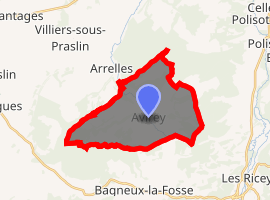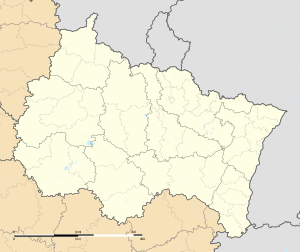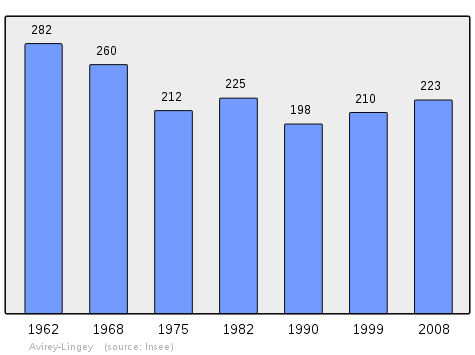Avirey-Lingey
Avirey-Lingey is a French commune in the Aube department in the Grand Est region of north-central France.
Avirey-Lingey | |
|---|---|
The bridge over the Sarce in Avirey-Lingey | |
Location of Avirey-Lingey 
| |
 Avirey-Lingey  Avirey-Lingey | |
| Coordinates: 48°01′35″N 4°18′03″E | |
| Country | France |
| Region | Grand Est |
| Department | Aube |
| Arrondissement | Troyes |
| Canton | Les Riceys |
| Intercommunality | CC Barséquanais Champagne |
| Government | |
| • Mayor (2014-2020) | Magali Rebours |
| Area 1 | 17.85 km2 (6.89 sq mi) |
| Population (2017-01-01)[1] | 206 |
| • Density | 12/km2 (30/sq mi) |
| Time zone | UTC+01:00 (CET) |
| • Summer (DST) | UTC+02:00 (CEST) |
| INSEE/Postal code | 10022 /10340 |
| 1 French Land Register data, which excludes lakes, ponds, glaciers > 1 km2 (0.386 sq mi or 247 acres) and river estuaries. | |
The inhabitants of the commune are known as Arivey-Lingeois or Arivey-Lingeoises.[2]
Geography
Avirey-Lingey is located some 35 km south-east of Troyes and 40 km east of Saint-Florentin. Access to the commune is by the D32 road from Arrelles in the north which passes through the commune and the village and continues south to Bagneux-la-Fosse. The D142 goes west from the village to join the D3 south-west of Chaource. The D184 goes north-east from the village to join the D36 west of Polisy. The village of Lingey is to the north-west of the main village. The commune is mixed forest and farmland.[3]
The Sarce river flows through the centre of the commune from south-east to north-west where it continues north to join the Seine at Virey-sous-Bar.[3]
Neighbouring communes and villages[3]
Toponymy
The name Avirey comes from a Roman man's name Avirius[4]
Older versions have been attested: Avireium in 1081, Avirey in 1793, and Avirey-Luigé in 1801.[5]
History
Avirey-Lingey was created through the merger of two parishes, Avirey and Lingey, after the French revolution. A legend tells of a patron saint named Saint Phal who lived in the commune during the 6th century and is registered in the Roman Martyrology. He promoted the fertility of women.[6]
Its vineyard was appreciated by King Henri IV who invited his minister, Maximilien de Béthune, Duke of Sully, to come and drink a glass of his "good wine from Avirey".[7]
During the 17th century there were only few people in the area due to epidemics and famine.
In 1872, Avirey-Lingey consisted of four holiday inns, five grocers, a mill, and a traditional oil mill.[6]
Since 2004 the municipality has launched several major projects related to the conservation and preservation of local heritage, in particular its two main buildings: the church and the town hall.[8] The church was closed in 2004 and a notice of unfitness signed in 2006.[9]
In January 2013, the Mayor announced the development of a socio-cultural hall and the repair of the roof of the Town Hall.[10]
The roof of the Town Hall, which has the distinction of having a bell, was completed in 2013. Restoration work for the Church of Saint-Phal began in 2009 and continued in 2013.[8]
Administration
As the population of the commune is between 100 and 500, the number of members of the municipal council is 11.[11]
List of Successive Mayors[12]
| From | To | Name | Party | Position |
|---|---|---|---|---|
| 1857 | Aubry | |||
| 2001 | 2008 | Serge Mathieu | ||
| 2008 | 2020 | Magali Rebours |
(Not all data is known)
Demography
In 2010 the commune had 220 inhabitants. The evolution of the number of inhabitants is known from the population censuses conducted in the commune since 1793. From the 21st century, a census of communes with fewer than 10,000 inhabitants is held every five years, unlike larger communes that have a sample survey every year.[Note 1]
| 1793 | 1800 | 1806 | 1821 | 1831 | 1836 | 1841 | 1846 | 1851 |
|---|---|---|---|---|---|---|---|---|
| 588 | 721 | 700 | 830 | 895 | 902 | 822 | 760 | 805 |
| 1856 | 1861 | 1866 | 1872 | 1876 | 1881 | 1886 | 1891 | 1896 |
|---|---|---|---|---|---|---|---|---|
| 734 | 764 | 474 | 676 | 677 | 641 | 663 | 620 | 599 |
| 1901 | 1906 | 1911 | 1921 | 1926 | 1931 | 1936 | 1946 | 1954 |
|---|---|---|---|---|---|---|---|---|
| 560 | 515 | 487 | 409 | 384 | 359 | 313 | 326 | 301 |
| 1962 | 1968 | 1975 | 1982 | 1990 | 1999 | 2006 | 2010 | - |
|---|---|---|---|---|---|---|---|---|
| 282 | 260 | 212 | 225 | 198 | 210 | - | 220 | - |

Distribution of Age Groups
Unlike national and departmental allocations, the male population of the town is greater than the female population (50.9% against 48.4% nationally and 48.2% at the departmental level).
Percentage Distribution of Age Groups in Avirey-Lingey and Aube Department in 2010
| Avirey-Lingey | Avirey-Lingey | Aube | Aube | |
|---|---|---|---|---|
| Age Range | Men | Women | Men | Women |
| 0 to 14 Years | 17.5 | 18.3 | 19.1 | 17.6 |
| 15 to 29 Years | 15.8 | 11.9 | 18.7 | 16.6 |
| 30 to 44 Years | 25.4 | 25.7 | 19.5 | 18.5 |
| 45 to 59 Years | 21.9 | 21.1 | 20.8 | 20.3 |
| 60 to 74 Years | 10.5 | 11.9 | 14.7 | 15.1 |
| 75 to 89 Years | 7.9 | 10.1 | 6.7 | 10.6 |
| 90 Years+ | 0.9 | 0.9 | 0.4 | 1.3 |
Sources:
Education
Avirey-Lingey is located in the Academy of Reims .
The commune does not administer any preschool or elementary school.[13]
Cultural events and festivities
The commune participates in the theatre festival "From one scene to another" using its multipurpose hall. The third festival was held in 2013.[14]
The "Road of Champagne Festival" is a major event that lasts two days and took place in Avirey-Lingey in 2008. The attendance record then was broken with over 30,000 visitors.
Health
There is no doctor or nurse in Avirey-Lingey. The nearest are located in Riceys.
Media
The regional daily L'Est-Éclair publication provides local information on the commune.[15]
The commune has no ADSL node connection ADSL installed, nor is it connected to a fibre optic network. Telephone lines are connected to an exchange located in Bagneux-la-Fosse.[16]
Worship
Only Catholic worship is available in Avirey-Lingey. The town is one of the seven communes grouped in the parish of "Riceys" which is one of the nine parishes in the pastoral area of "Côtes des Bar" in the diocese of Troyes. The place of worship is the parish church of Saint-Phal.[17]
Economy
Income and taxation
In 2011 the median household income tax was €34,189 which placed Avirey-Lingey at the 8933rd rank among the 31,886 communes of more than 49 households in France.[18]
In 2009 36.7% of fiscal households were not taxable.[19]
Employment
In 2009 the population aged 15–64 years was 141 people of whom there were 88.6% employable, 86.4% employed and 2.1% unemployed.[19]
There were 88 jobs in the commune compared to 81 in 1999. The number of active employed residents in the area of employment is 123, the indicator of concentration of jobs[Note 2] is 71.5% which means that the commune offers only three jobs per four employable people.[19]
Businesses and shops
On 31 December 2010 there were 53 businesses in Avirey-Lingey: 35 in agriculture-forestry-fishing, one in industry, one in construction, 13 in various trade-transport-services, and 3 were related to the administrative sector.[19]
In 2011 two new businesses were created in Avirey Lingey.[19]
In 2012, the florist was the only equipment and services business.[20]
Avirey-Lingey has been in the appellation d'origine contrôlée (AOC) zone for Chaource cheese since 1970 and has had a protected designation of origin (PDO) (European equivalent) since 1996.[21]
Culture and heritage
Religious heritage
The commune has one religious building that is registered as an historical monument:
The Church of Saint Phal (16th century).![]()
- Windows (16th century)

- Main Altar and Retable (19th century)

- A Processional friary staff: Saint Vincent (19th century)

- A Chasuble (19th century)

- A Chasuble and Stole (19th century)

- A Pail for Holy water (19th century)

- A Painting: Baptism of Christ (18th century)

- A Group Sculpture (16th century)

- A Group Sculpture: Two men (16th century)

- A Group Sculpture: two people sitting (16th century)

- A Group Sculpture: Creche (16th century)

- A Painting: Wayside Cross (19th century)

- A Processional friary staff: Saint Sacrement (18th century)

- A Processional friary staff: Saint Bishop (18th century)

- An Eagle Lectern (18th century)

- A Processional friary staff: Virgin (18th century)

- A Reliquary of Saint Fidolus (18th century)

- Views of the exterior of the Church of Saint-Phal.
- Other sites of interest
The Chapel of Saint-Genevieve at Lingey with a Romanesque nave and choir from the 16th century. The chapel was destroyed by fire in 1722 and the repairs from 1726 to 1760 distorted the structure. The Chapel contains a number of items that are registered as historical objects:
- An Altar and Retable, Tabernacle (18th century)

- A liturgical book: Ritual (1658)

- An Ampoule of Holy Oil (19th century)

- An Ampoule of Holy Oil (19th century)

- A Cabinet-tabernacle-chest in the sacristy (19th century)

- A Group Sculpture: Education of the Virgin (17th century)

- A Statue: Saint Genevieve (17th century)

- A Tabernacle: Carrying of the Cross (19th century)

- 22 rows of Seating (18th century)

- The Choir enclosure: communion table (disappeared) (18th century)

- A Processional friary staff: Saint Genevieve (19th century)

- A Statue: Saint Genevieve (18th century)

See also
Bibliography
- Daniel Delattre, Emmanuel Delattre, Nathalie Delattre-Arnould, Odette Delattre, and Laëtitia Delattre-Rigaux: Aube, the 433 communes, Éditions Delattre, 2005, reprint 2013, 240 pages, ISBN 978-2-36464-035-1, N.B.: this book has a chapter on each commune in the department of Aube (in French)
- Laurent Denajar, "Aube", Vol 10 of Archaeological Map of Gaul, Les Éditions de la MSH, 2005, ISBN 978-2-87754-093-3, Chapter on Arrentières (in French)
External links
- Avirey-Lingey on Lion1906
- Avirey-Lingey on Géoportail, National Geographic Institute (IGN) website (in French)
- Avirey le Bois on the 1750 Cassini Map
Notes and references
Notes
- At the beginning of the 21st century, the methods of identification have been modified by Law No. 2002-276 of 27 February 2002 Archived 6 March 2016 at the Wayback Machine, the so-called "law of local democracy" and in particular Title V "census operations" allows, after a transitional period running from 2004 to 2008, the annual publication of the legal population of the different French administrative districts. For communes with a population greater than 10,000 inhabitants, a sample survey is conducted annually, the entire territory of these communes is taken into account at the end of the period of five years. The first "legal population" after 1999 under this new law came into force on 1 January 2009 and was based on the census of 2006.
- The indicator of concentration of employment is the number of employed people per 100 employable people resident in the commune as defined by Insee.
References
- "Populations légales 2017". INSEE. Retrieved 6 January 2020.
- Inhabitants of Aube (in French)
- Google Maps
- Ernest Nègre, General Toponymy of France, Librairie Droz, 1990, 708 pages, ISBN 2-60002-883-8 (in French).
- Communal Notice on the Cassini website (in French)
- Daniel Delattre, Emmanuel Delattre, Nathalie Delattre-Arnould, Odette Delattre, and Laëtitia Delattre-Rigaux, Aube, the 433 communes, Éditions Delattre, 2005, reprint 2013, 240 pages, ISBN 978-2-36464-035-1 (in French).
- Avirey-Lingey: a balcony on the hills Archived March 4, 2014, at the Wayback Machine, La Champagne Viticole, January 2014, No. 797, consulted on 4 March 2014 (in French).
- Safeguarding heritage and protection of inhabitants on the menu, 19 November 2013, L'Est-Éclair, consulted on 3 March 2014 (in French).
- Little by little, the church finds its former splendour Archived 2014-03-03 at Archive.today, 29 October 2012, L'Est-Éclair, consulted on 3 March 2014 (in French).
- Report on 2012 and projection for 2013, 19 January 2013, L'Est-Éclair, consulted on 3 March 2014 (in French).
- art L. 2121-2 of the General Code of Collective Territories (in French).
- List of Mayors of France (in French)
- Annual of National Education, Ministry of National Education website, consulted on 2 March 2014 (in French).
- Pleasure in scenery and in the hall, Sylvie Virey, 17 November 2013, L'Est-Éclair, consulted on 3 March 2014 (in French).
- Search Results Archived 2014-03-12 at Archive.today, L'Est-Éclair, consulted on 12 March 2014 (in French).
- ADSL at Avirey-Lingey, the web portal dedicated to internet and broadband service provider offerings, consulted on 12 March 2014 (in French).
- Diocese of Troyes website Archived March 16, 2014, at the Wayback Machine, consulted on 15 March 2014 (in French).
- Page RFDM2011COM: Local Fiscal Revenue of households - 2011, INSEE, consulted on 16 November 2013 (in French).
- Avirey-Lingey on INSEE Archived 2014-03-02 at the Wayback Machine (in French)
- Number of Equipment and Services shops in 2012, INSEE, consulted on 4 March 2014 (in French).
- Chaource, 3 April 2013, Institut national de l'origine et de la qualité (INAO) website, consulted on 12 March 2014 (in French).
- Ministry of Culture, Mérimée PA00078024 Church of Saint Phal (in French)

- Ministry of Culture, Palissy PM10000101 Windows (in French)
- Ministry of Culture, Palissy IM10003715 Main Altar and Retable (in French)

- Ministry of Culture, Palissy IM10003714 Processional friary staff: Saint Vincent (in French)

- Ministry of Culture, Palissy IM10003713 Chasuble (in French)

- Ministry of Culture, Palissy IM10003712 Chasuble and Stole (in French)

- Ministry of Culture, Palissy IM10003711 Pail for Holy water (in French)

- Ministry of Culture, Palissy IM10003710 Painting: Baptism of Christ (in French)

- Ministry of Culture, Palissy IM10003709 Group Sculpture (in French)

- Ministry of Culture, Palissy IM10003708 Group Sculpture: Two men (in French)

- Ministry of Culture, Palissy IM10003707 Group Sculpture: two people sitting (in French)

- Ministry of Culture, Palissy IM10003706 Group Sculpture: Creche (in French)

- Ministry of Culture, Palissy IM10003705 Painting: Wayside Cross (in French)

- Ministry of Culture, Palissy IM10003365 Processional friary staff: Saint Sacrement (in French)

- Ministry of Culture, Palissy IM10003364 Processional friary staff: Saint Bishop (in French)

- Ministry of Culture, Palissy IM10003363 Eagle Lectern (in French)

- Ministry of Culture, Palissy IM10003362 Processional friary staff: Virgin (in French)

- Ministry of Culture, Palissy IM10003361 Reliquary of Saint Fidolus (in French)

- Ministry of Culture, Palissy IM10003367 Altar and Retable, Tabernacle (in French)

- Ministry of Culture, Palissy IM10003718 Liturgical book: Ritual (in French)

- Ministry of Culture, Palissy IM10003717 Ampule of Holy Oil (in French)

- Ministry of Culture, Palissy IM10003716 Ampule of Holy Oil (in French)

- Ministry of Culture, Palissy IM10003375 Cabinet-tabernacle-chest in the sacristy (in French)

- Ministry of Culture, Palissy IM10003374 Group Sculpture: Education of the Virgin (in French)

- Ministry of Culture, Palissy IM10003373 Statue: Saint Genevieve (in French)

- Ministry of Culture, Palissy IM10003372 Tabernacle: Carrying of the Cross (in French)

- Ministry of Culture, Palissy IM10003371 22 rows of Seating (in French)

- Ministry of Culture, Palissy IM10003370 Choir enclosure: communion table (in French)
- Ministry of Culture, Palissy IM10003369 Processional friary staff: Saint Genevieve (in French)

- Ministry of Culture, Palissy IM10003368 Statue: Saint Genevieve (in French)

| Wikimedia Commons has media related to Avirey-Lingey. |